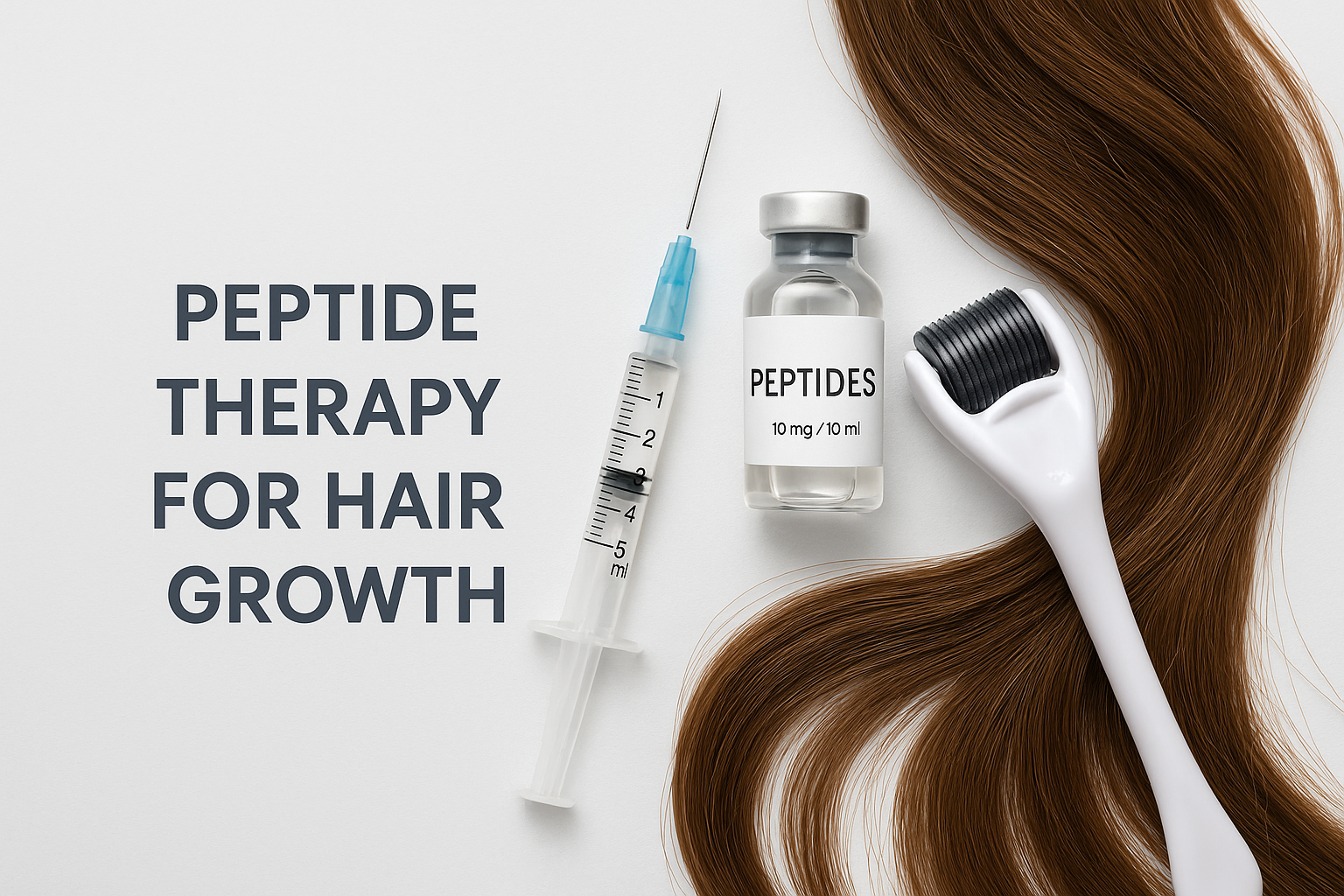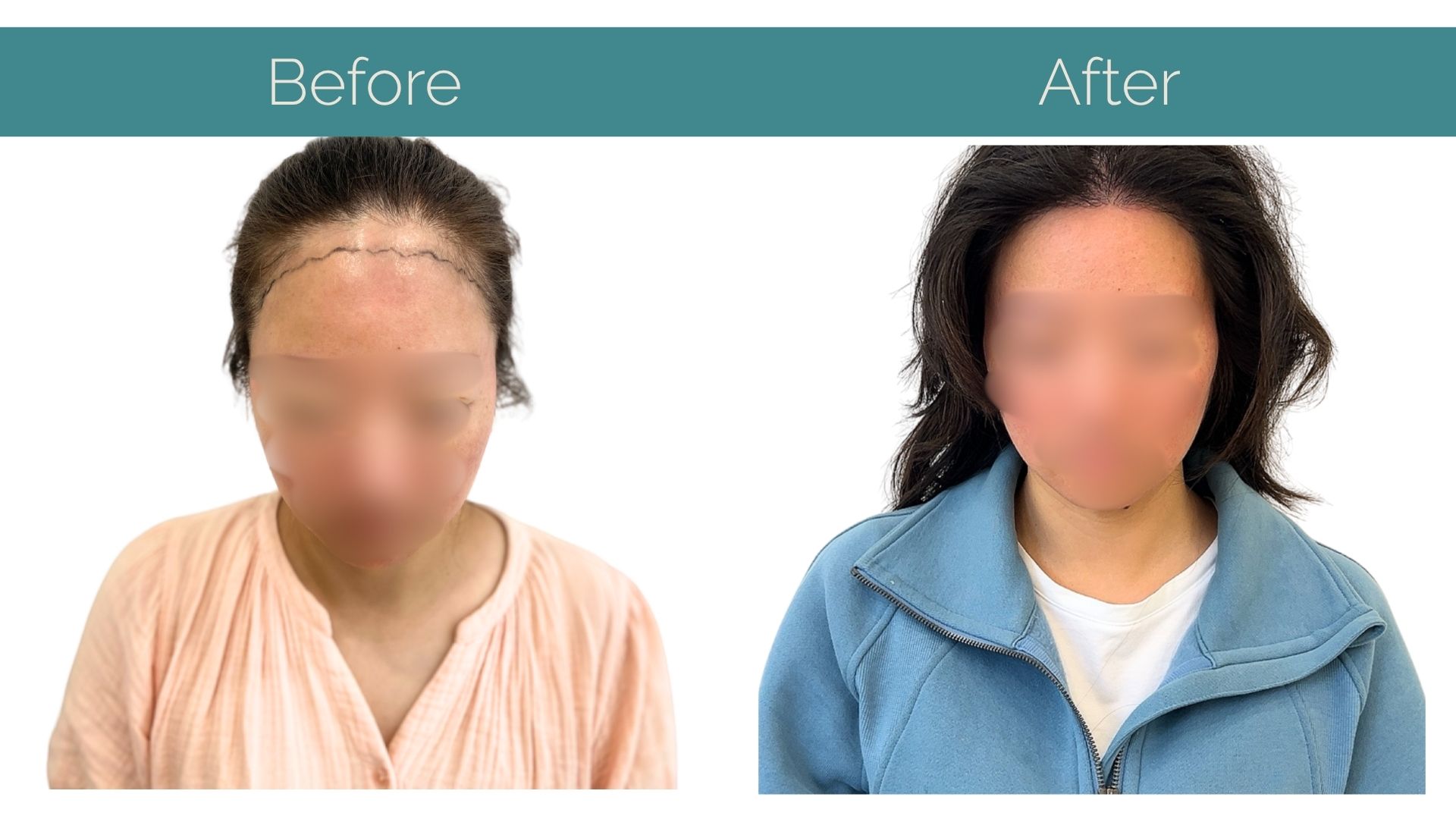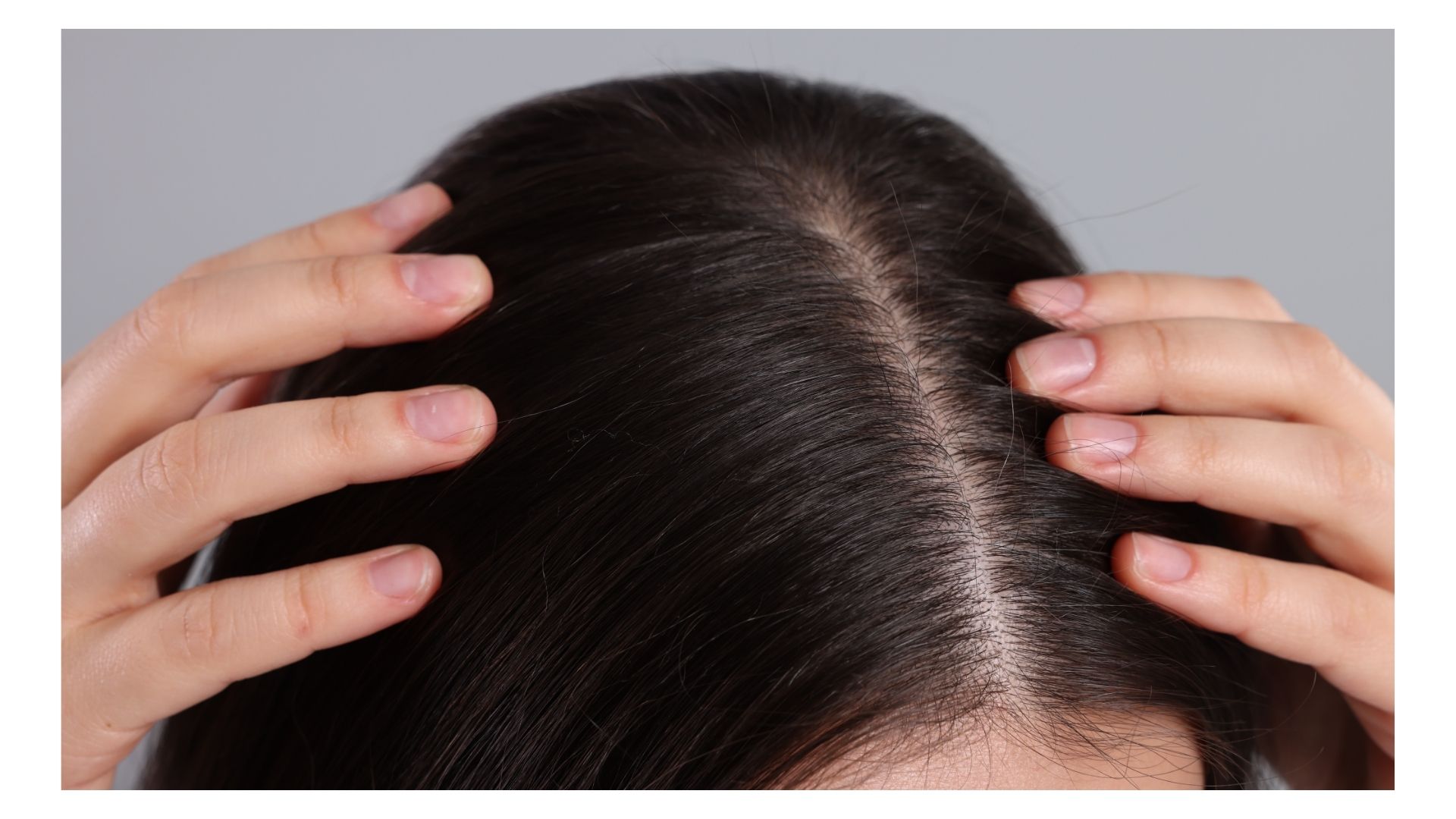With a wave of new treatments hitting the scene, one buzzword stands out: peptides. But what exactly are peptides, and can they genuinely help you regrow your hair?
Let’s dive into this exciting, emerging world of peptide therapy for hair growth – in a way that’s friendly, clear, and genuinely helpful.
What Are Peptides and Why Are They Being Used for Hair Growth?
Peptides are short chains of amino acids – think of them as tiny building blocks that help your body perform vital tasks.
In the world of beauty and medicine, peptides have already made their mark, known for their skin rejuvenation and anti-aging powers. Now, they’re gaining attention for something equally exciting: promoting hair growth and improving scalp health.
Certain peptides interact with the cells in your scalp to send important signals – encouraging hair follicles to stay in the growth phase longer, repairing follicle damage, and calming inflammation that can trigger shedding.
They’re like a gentle nudge to your body, reminding it to keep those hair-producing engines running.
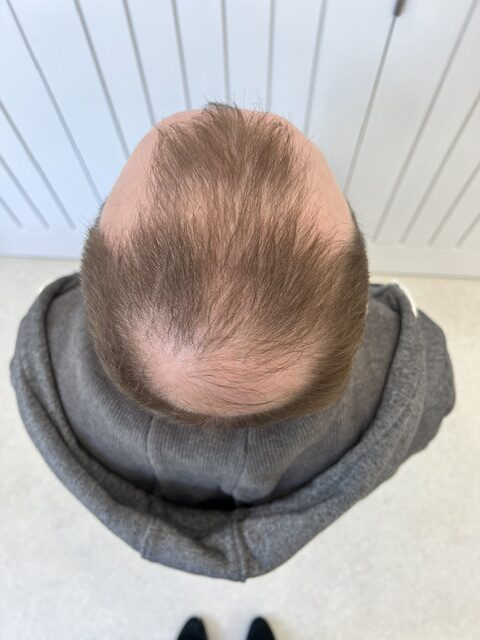
How Peptide Therapy Is Applied
Peptide treatments for hair growth typically come in a few easy-to-use forms:
Topical Serums or Sprays: These are massaged directly into the scalp, often once or twice daily. They’re popular because they’re non-invasive and easy to incorporate into your routine.
Microneedling with Peptides: Some clinics combine peptides with microneedling, using tiny pinpricks to help the peptides penetrate deeper into the scalp for better results.
Injectable Peptides: In some advanced settings, peptides can be injected directly into the scalp (similar to PRP therapy) to target areas more aggressively.
The best method depends on your hair goals, the extent of hair thinning, and how aggressive you want to be with your treatment plan.
What the Science Says: Clinical Evidence So Far
Clinical research on peptide therapy for hair growth is still relatively new, but the early signs are promising.
Studies suggest that peptides like GHK-Cu (Copper Peptides) stimulate hair follicles, extend the growth phase, and reduce inflammation – all crucial factors for maintaining a healthy scalp environment where hair can thrive.
However, it’s important to keep one foot on the ground: while results have been encouraging, scientists and dermatologists agree that larger, longer-term studies are still needed to truly understand the long-term safety and effectiveness of peptide therapy.
Many clinics are now pairing peptides with other regenerative treatments like PRP (Platelet-Rich Plasma) or stem cell therapy to amplify results – a combined approach that shows a lot of promise for people looking for real, lasting improvement.
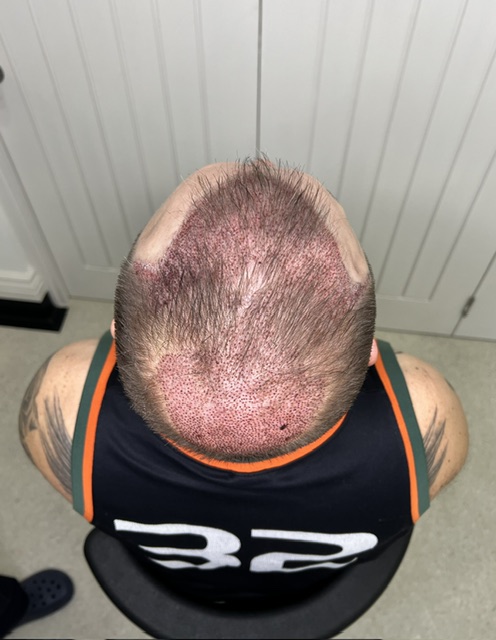
Which Peptides Are Best for Hair Growth?
Choosing the right peptide depends on various factors – your health history, lifestyle, genetic predispositions, and even stress levels.
Copper Peptides (GHK-Cu): Widely considered the gold standard for hair restoration. These peptides are known for their ability to boost blood flow, repair tissue, reduce scalp inflammation, and help reactivate dormant follicles.
Collagen Peptides: Ideal for those wanting to improve hair strength, thickness, and scalp elasticity. While they don’t directly spark new hair growth, they create a healthier foundation for your hair.
Multi-Peptide Formulas: Look for serums that combine copper peptides with biotinoyl tripeptide-1 and acetyl tetrapeptide-3 – a winning cocktail for promoting fuller, denser hair.
What Can You Expect From Peptide Therapy?
One of the biggest misconceptions about hair treatments is expecting overnight miracles. Peptide therapy is a marathon, not a sprint.
Most people need at least 3–6 months of consistent use before seeing noticeable improvements. Hair follicles move slowly through growth cycles, so patience is key. Think of it like planting seeds: you need time, nourishment, and consistency to see the garden bloom.
Combining peptide therapy with healthy habits – like stress management, a nutrient-rich diet, and gentle scalp care – can also speed up and improve your results.
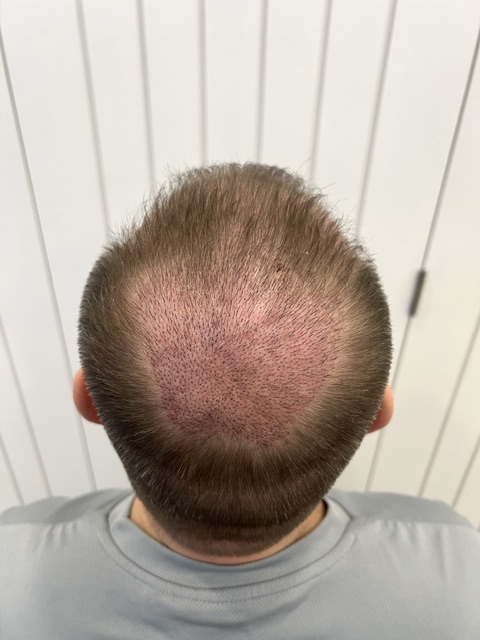
Who Might Benefit Most from Peptide Therapy?
Peptide therapy isn’t just for those experiencing heavy hair loss. It can be a fantastic option for:
Early-stage thinning: Catching hair loss early gives peptides a better chance of restoring follicle health.
Men and women post-pregnancy or during hormonal changes: These shifts often cause shedding, and peptides can help rejuvenate follicles naturally.
People recovering from illness or high-stress periods: Stress-related hair loss can sometimes be reversed with scalp-nourishing treatments like peptides.
Those wanting to enhance existing hair transplant results: Supporting transplanted hair follicles with peptides could improve outcomes.
If you’re dealing with total baldness in certain areas, however, peptide therapy may be less effective – because once follicles are completely inactive, more aggressive treatments might be needed.
FAQs: Your Quickfire Guide to Peptides and Hair Growth
1. What is the best peptide for hair loss?
Copper peptides (GHK-Cu) are the most researched, known for improving follicle health, boosting density, and reducing scalp inflammation.
2. Does BPC 157 regrow hair?
While BPC 157 is fantastic for tissue healing and reducing inflammation, there’s limited clinical evidence supporting its use specifically for hair regrowth.
3. Do collagen peptides regrow hair?
Not directly. Collagen helps support hair strength and scalp health, but it doesn’t stimulate new hair growth like copper peptides or hair-targeted multi-peptide blends.
4. Which peptide serum is best for hair?
Serums containing copper peptides, biotinoyl tripeptide-1, and acetyl tetrapeptide-3 offer the best blend for promoting thicker, healthier hair.
5. Do peptides work for hair growth?
Early studies show that peptides can stimulate follicles, reduce shedding, and improve hair density – especially when used consistently over several months.
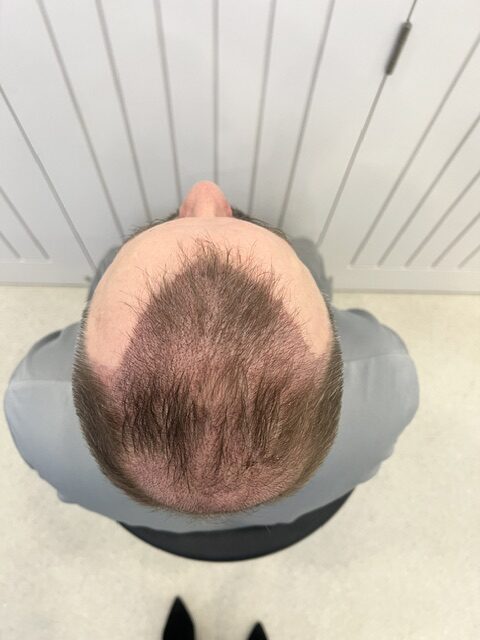
Final Thoughts: Should You Try Peptide Therapy?
If you’re starting to notice more hair on your brush than usual, or your once-thick ponytail feels a little thinner, peptide therapy could offer a gentle yet powerful solution.
It’s not a “miracle cure” – but when used consistently (and often alongside other treatments), it offers real potential for healthier, fuller hair.
Most importantly, success with peptides comes from working with a clinic, like IK Clinics, that understands how to tailor treatments to you. Your hair’s story is unique – and modern solutions like peptide therapy might just help you write the next (and best) chapter.
About IK Clinics
At IK Clinics, we are proud to stay at the forefront of global hair restoration trends, offering a variety of advanced techniques to meet the diverse needs of our clients. From FUE, PRP to Stem Cell Therapy, we ensure that every client’s treatment is tailored to their personal goals, helping them regain not just their hair but also their confidence.
Interestingly, we don’t just stop at hair restoration treatments, our highly skilled team also offers a range of anti-aging treatments.
